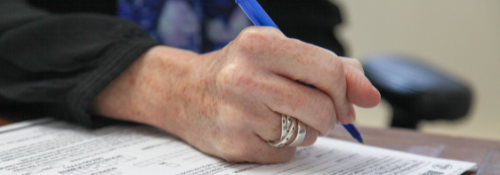
For an individual who is homeless and living with a Severe and Persistent Mental Illness (SPMI), wrap-around supports can make all the difference. That is exactly what Wyandot Center’s SOAR (SSI/SSDI Outreach, Access and Recovery) team offers.
“We try to meet all of their needs,” says Annie Kessler, SOAR case manager. “When we meet with them for the first time, we find out everything that is going on and what they need help with.”
Since its creation 12 years ago, Wyandot Center’s SOAR team has helped hundreds of individuals apply for and receive Supplemental Security Income (SSI) or Social Security Disability Insurance (SSDI) benefits. During the 2020-2021 fiscal year, the team received more than 120 referrals from Wyandot Center and other agencies.
The SOAR team helps individuals who are homeless or are at-risk of homelessness who also live with SPMI. The SOAR case managers work alongside an individual’s case manager and other providers on their treatment team to complete the paperwork necessary to apply for SSI/SSDI benefits. The team can also help an individual obtain a presumptive Medicaid card so that they can receive needed medical care while they wait for their claim to be approved.
The work that the SOAR team does can go a long way toward providing needed opportunities.
“If a client doesn’t have any income at the moment, being approved for SSI/SSDI benefits can give them a sense of peace and that feeling of ‘finally, I have some income coming in and I can move toward my next goal,’” says Royal Gatson, SOAR team supervisor.
The benefits can help an individual to secure housing, buy food, pay for needed medical care and allow them to find a part-time job. The SOAR team’s ultimate goal is to provide stability.
“When I see them years later, they are always crying when they see me. It’s tears of joy because it really got them their life back.”
“We want them to find success in their own lives,” says Francoise Borchardt, SOAR case manager. “That includes being successful with handling their own funds, maintaining a part-time job, securing and maintaining housing and staying on track with their mental health treatment. We want them to feel like they’re part of society again.”
In addition to being able to afford the necessities, receiving SSI/SSDI benefits can also create the financial flexibility needed for individuals to begin enjoying hobbies again.
“I’ve heard a few times from clients who say ‘oh, I’m so glad I have this money now because I can start Zumba classes again,’” says Borchardt. “It allows them to have fun things again. They can go to the gym or do cultural activities. They can finally go back to pursuing their hobbies and interests again.”
“We have some clients who have not enjoyed a hobby in a year or two,” Kessler adds. “So having that little bit of extra money to do things again, it means everything to them.”
Gatson says when an individual finds out that they’ve been approved, the reaction is often a combination of happiness and disbelief.
“When I see them years later, they are always crying when they see me,” says Kessler. “It’s tears of joy because it really got them their life back.”
